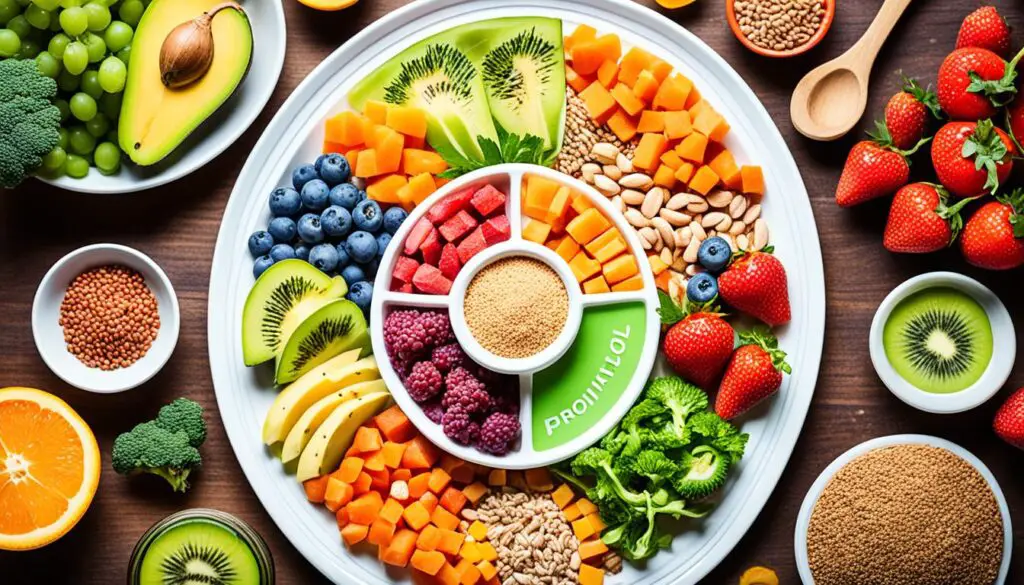Did you know that more than 60% of people who complete the HCG diet struggle to maintain their weight afterwards? While the HCG diet can lead to successful weight loss, many individuals find it challenging to stabilize their weight once they have completed the program.
After the HCG injections and strict calorie restrictions are discontinued, the body can often go into a “starvation mode” and hold onto calories, resulting in weight gain. To prevent this and achieve long-term weight stability, it is essential to make dietary and lifestyle adjustments during the HCG maintenance phase.
Key Takeaways:
- 60% of people struggle to maintain weight after completing the HCG diet.
- HCG maintenance requires dietary and lifestyle adjustments.
- Gradually increase calorie intake to avoid confusing the body.
- Reintroduce sugars and starchy foods slowly after the HCG diet period.
- Regular exercise is crucial for maintaining weight loss after the HCG diet.
The Problem with HCG Dieters
The effectiveness of HCG injections in stimulating the hypothalamus gland to release stored fat is well-known, leading to significant weight loss for many individuals. However, once the injections are stopped, a common problem arises for HCG dieters – the body’s tendency to enter a “starvation mode,” resulting in the retention of calories and weight gain. This poses a challenge for those seeking to maintain their weight after completing the HCG protocol.
To overcome this issue, it becomes imperative to make certain dietary and lifestyle adjustments to ensure weight stability in the post-HCG dieting period. These adjustments can help prevent the body from holding on to excess calories and aid in maintaining the desired weight achieved during the program.
By following some simple HCG diet weight stabilization tips, individuals can effectively manage the post-HCG protocol phase and maintain their weight in a healthy manner.
Here are some key tips for maintaining weight after the HCG protocol:
- Gradually adjust calorie intake: Rather than abruptly increasing calorie intake, it is advisable to gradually increase it over time. This allows the body to adapt without triggering weight gain. Incrementally adding 200 kcal per week until reaching the ideal calorie intake for weight maintenance can help stabilize weight effectively.
- Make dietary modifications: Transitioning back to a normal diet routine should be done with care. Slowly reintroducing sugars and starchy foods while starting with low-carb and low-fat options is recommended. Practicing moderation and monitoring weight during this phase can help avoid sudden weight fluctuations.
- Establish an exercise routine: Regular exercise plays a crucial role in maintaining weight after completing the HCG protocol. Engaging in a combination of cardiovascular exercises and resistance training for at least 75 minutes of vigorous exercise or 150 minutes of moderate exercise per week can contribute to weight stability.
By implementing these tips and making conscious efforts to manage calorie intake, dietary choices, and exercise habits, individuals can successfully navigate the post-HCG protocol phase and maintain the weight loss achieved during the program.
Remember, the key to sustaining weight loss lies in finding a balance between calorie intake and expenditure, along with adopting a healthy and active lifestyle. It is essential to remain patient and focused on long-term success, while also considering additional strategies such as medically supervised HCG programs for guidance and support.
Gradual Increase of Calorie Intake
To ensure effective weight stabilization during the HCG maintenance program, it is crucial to gradually increase calorie intake after completing the HCG diet. By doing so, we can avoid confusing the body and prevent sudden weight fluctuations. The process of gradually increasing calorie intake allows the body to adjust and find equilibrium at the optimum number of calories for weight maintenance.
To initiate the gradual increase, I recommend adding 200 kcal per week to your daily calorie intake. This slow and steady approach gives your body time to adapt and ensures a sustainable transition from the HCG diet phase to the maintenance phase. By monitoring your body’s response and carefully adjusting your calorie intake week by week, you can effectively stabilize your weight and achieve long-term success.
The Importance of Monitoring Weight
During the HCG maintenance program, monitoring your weight is crucial for detecting any changes and making necessary adjustments to your calorie intake. By regularly weighing yourself, preferably on the same day and time each week, you can identify any deviations from your desired weight range.
“Monitoring your weight allows you to catch any upward or downward trends, helping you make appropriate adjustments to your calorie intake.”
Based on your weight monitoring, if you notice that you are consistently losing weight, it may indicate that your calorie intake needs to be increased further. Conversely, if you observe steady weight gain, you may need to make slight reductions in your daily calories. This careful monitoring and adjustment process is the key to stabilizing your weight during the HCG maintenance phase.
Gradually Adjusting Calorie Intake
As you progress through the HCG maintenance program, it’s essential to listen to your body and make gradual adjustments to your calorie intake based on its response. If you notice weight gain, consider reducing your calorie intake slightly until your weight stabilizes within your desired range. Conversely, if you are consistently losing more weight than desired, try increasing your calorie intake slightly to help maintain a healthy weight.
Remember, the purpose of the HCG maintenance program is not just to stabilize your weight but also to establish healthy eating habits that will support long-term weight management. By gradually increasing calorie intake, monitoring your weight, and adjusting accordingly, you can successfully stabilize your weight during the HCG maintenance phase and transition smoothly into a sustainable lifestyle.
Bringing Back Your Normal Diet Routine

After completing the HCG diet period, it is essential to reintroduce sugars and starchy foods into your diet slowly to achieve weight stabilization. Instead of rushing into your previous eating habits, it is recommended to start with low-carb and low-fat options while practicing moderation.
By gradually incorporating these foods back into your diet, you give your body time to adjust and prevent sudden weight fluctuations. Start by including small portions of healthy carbohydrates, such as whole grains, fruits, and vegetables, in your meals.
Monitor your weight closely during this period to track how your body responds to the reintroduction of these foods. If you notice any significant changes in weight, it may require adjusting your calorie intake or making further modifications to your diet.
“After the HCG diet period, it is crucial to allow your body to adapt to a normal diet routine gradually. Slowly reintroducing sugars and starchy foods while monitoring weight can help achieve long-term weight stabilization.”
By bringing back your normal diet routine thoughtfully and with attention to portion sizes, you can maintain the weight you achieved during the HCG diet and promote long-term weight control.
Formulating an Exercise Routine
Regular exercise plays a vital role in maintaining weight loss after completing the HCG diet. During the diet period, calorie restrictions may limit physical activity, but once the program is over, it’s important to prioritize exercise for sustainable weight management. Incorporating a well-rounded exercise routine can help you maintain your weight loss goals and promote overall health and well-being.
Choosing the Right Activities
When formulating your exercise routine, aim for a balance between cardiovascular exercises and resistance training. Cardiovascular exercises, such as running, swimming, or cycling, help burn calories and improve cardiovascular health. Resistance training, on the other hand, helps build lean muscle mass, which can increase your metabolism and aid in weight management.
You may want to include a variety of activities that you enjoy and that fit into your lifestyle. This could include activities like hiking, dancing, or playing a sport. By choosing activities you find enjoyable, you’re more likely to stick with your exercise routine long-term.
Setting Realistic Goals
It’s important to set realistic goals when it comes to exercise. Start by aiming for at least 75 minutes of vigorous exercise or 150 minutes of moderate exercise per week, as recommended by the American Heart Association. This can be spread out over several days, allowing for flexibility in your schedule.
Gradually increase the intensity and duration of your workouts over time. This will help you build strength and endurance while avoiding injury. Remember, consistency is key when it comes to maintaining weight loss.
Tracking Progress
Tracking your progress can provide motivation and help you stay accountable to your exercise routine. Consider keeping a workout journal or using a fitness tracking app to record your activities, duration, and intensity. You can also track other fitness metrics like heart rate or distance covered if it aligns with your goals.
By monitoring your progress, you can celebrate milestones and make necessary adjustments to your routine as needed. It’s important to listen to your body and make modifications based on any physical limitations or changes in your fitness level.
Keeping it Fun and Sustainable
Lastly, make sure to keep your exercise routine enjoyable and sustainable. Incorporate variety by trying new activities or joining group fitness classes. Engaging in physical activities with friends or family members can also make exercise more enjoyable and serve as a source of social support.
Remember, exercise is not solely about weight management—it’s about overall health and well-being. Find activities that bring you joy and make you feel good both mentally and physically. By prioritizing exercise and maintaining a consistent routine, you’ll not only sustain your weight loss after the HCG diet but also cultivate a healthy and active lifestyle.
The Role of Medically Supervised HCG Programs

When it comes to weight loss, having professional guidance and support can make all the difference. Medically supervised HCG programs offer precisely that, ensuring that your weight loss journey is safe, effective, and tailored to your specific needs. These programs provide a comprehensive approach to weight management, combining the benefits of the HCG diet with medical supervision and personalized care.
Choosing a clinic that is authorized to carry out HCG procedures is crucial for your safety and peace of mind. With the help of medically supervised HCG programs, you can rest assured that you are receiving top-notch care from trained professionals who understand the intricacies of the HCG diet.
Search phrases like “HCG diet near me” can help you locate authorized clinics in your area, ensuring that you have easy access to the expertise and support you need throughout your weight loss journey.
Benefits of Medically Supervised HCG Programs
Medically supervised HCG programs offer several benefits that contribute to successful weight loss and long-term weight stability:
- Personalized Approach: Each individual is unique, and their weight loss journey should reflect that. With medically supervised HCG programs, you can expect customized plans that take into account your specific goals, medical history, and lifestyle factors.
- Professional Guidance: HCG programs are overseen by medical professionals who are experienced in weight management. They can provide valuable guidance and support, ensuring that you stay on track and make informed decisions throughout the process.
- Monitoring and Accountability: Regular check-ins and appointments with your healthcare provider allow for ongoing monitoring of your progress. This not only helps keep you accountable but also enables adjustments to be made to your plan if needed.
- Safe and Effective Protocols: Medically supervised HCG programs follow established protocols that prioritize your health and safety. By ensuring that you are receiving the correct dosage of HCG and following the appropriate dietary guidelines, these programs optimize your chances of success.
Whether you are looking to lose weight or maintain your weight after completing the HCG diet, a medically supervised program can provide the knowledge, support, and guidance you need. Don’t hesitate to reach out and explore the benefits of medically supervised HCG programs in your journey towards optimal health and well-being.
Testimonial
“Thanks to the medically supervised HCG program, I was able to reach my weight loss goals with confidence. The personalized approach, ongoing support, and professional guidance made all the difference. I highly recommend it!” – Sarah
The hCG Diet and Weight Loss Protocol
The hCG diet is a weight loss program that involves a combination of intense calorie restriction and daily hCG injections. This protocol, developed by Dr. Simeon, follows a specific structure with various phases: loading, fat burn, and maintenance. Understanding and following the principles of the hCG diet are essential for achieving successful weight loss and stabilizing weight after completing the program.
During the loading phase, individuals consume high-calorie foods to build up fat stores. This is followed by the fat burn phase, where calorie intake is drastically reduced to promote weight loss. The hCG injections help stimulate the hypothalamus gland to release stored fat for energy.
Once the fat burn phase is completed, the maintenance phase begins. This phase focuses on reintroducing a wider range of foods while maintaining weight stability. Calorie intake is gradually increased to prevent the body from going into “starvation mode” and holding on to calories.
The Importance of Following the Protocol
Following the hCG diet protocol is crucial for achieving optimal weight loss and stabilizing weight after completing the program. The specific phases and calorie restrictions are designed to target fat loss while preserving muscle mass. It is important to adhere to the recommended calorie intake and understand the dietary guidelines to achieve the desired results.
“The hCG diet protocol provides a structured framework for successful weight loss. It is important to follow the specific phases and dietary recommendations to achieve optimal results.” – Dr. Smith, Weight Loss Specialist
By following the protocol, individuals can experience significant weight loss results while minimizing muscle loss. Understanding the principles and guidelines of the hCG diet can help individuals make informed choices and sustain their weight loss achievements in the long term.
Tips for Stabilizing Weight after the hCG Diet
After completing the hCG diet, it is important to transition into a healthy and sustainable eating plan. Here are some tips for stabilizing weight and maintaining the results:
- Gradually increase calorie intake to prevent weight regain.
- Focus on consuming nutrient-dense foods and incorporating a variety of fruits, vegetables, lean proteins, and whole grains into your diet.
- Maintain regular exercise and physical activity to support weight management.
- Monitor your weight regularly and make adjustments to your diet and exercise routine as needed.
- Seek support from a healthcare professional or registered dietitian to help you navigate the post-hCG diet phase.
Avoiding Pitfalls while on hCG

When following the hCG diet, it’s important to be aware of certain pitfalls that could hinder your progress in maintaining weight after completing the protocol. By avoiding these pitfalls and implementing healthy habits, you can increase your chances of long-term weight stabilization and overall success.
1. Avoiding Oils and Oil-based Products
An important aspect of the hCG diet is the restriction of oral and topical oils. Oils can interfere with the effectiveness of the hCG injections and may hinder weight loss or weight maintenance. Therefore, it is crucial to read labels carefully and avoid any products, including toiletries and cosmetics, that contain oil.
2. Staying Hydrated
Hydration plays a vital role in maintaining weight after the hCG protocol. Drinking an adequate amount of water helps to support your body’s natural functions and can aid in curbing hunger cravings. Aim to drink at least 8 glasses (64 ounces) of water per day to stay well-hydrated and promote weight stability.
3. Eating Enough
One common mistake in the maintenance phase of the hCG diet is not consuming enough calories. The body needs a sufficient amount of energy to function properly and maintain weight stability. Ensure that you are eating enough calories from a variety of nutrient-dense foods to provide the necessary fuel for your body.
4. Taking a Daily Multivitamin
During the hCG diet and maintenance phase, it is essential to meet your nutritional needs. Taking a daily multivitamin can help fill any nutritional gaps and ensure that your body receives the necessary vitamins and minerals for optimal health. Consult with your healthcare provider to determine the best multivitamin option for you.
5. Practicing Patience
Maintaining weight after the hCG protocol requires patience. It is normal for your weight to fluctuate slightly during the first few weeks of the maintenance phase. Avoid becoming discouraged by minor fluctuations and trust the process. Stay consistent with your healthy habits, and over time, you will achieve weight stabilization.
| Pitfalls to Avoid | Healthy Habits to Implement |
|---|---|
| Avoid using oils and oil-based products | Stay hydrated by drinking enough water |
| Avoid consuming too few calories | Eat a balanced diet with enough calories |
| Don’t forget to take a daily multivitamin | Practice patience and trust the process |
By being mindful of these pitfalls and implementing healthy habits, you can navigate the hCG diet maintenance phase successfully. Remember, maintaining weight after the hCG protocol requires consistency and a commitment to leading a healthy lifestyle. Stay focused, listen to your body, and seek support if needed to achieve your weight stabilization goals.
Plateau Breakers for HCG Dieters
If you find that weight loss plateaus during the HCG diet, don’t be discouraged. There are several strategies you can try to break through the plateau and continue your weight loss journey. By making small adjustments to your routine, you can kickstart your metabolism and start seeing progress again.
1. Increase Water Intake
Staying hydrated is crucial for overall health and weight management. Increasing your water intake can help boost your metabolism, flush out toxins, and promote weight loss. Aim for at least eight glasses of water per day, and consider adding fruits or herbs to infuse some flavor.
2. Adjust Protein Portions
Protein is an essential nutrient for weight loss and muscle maintenance. Adjusting your protein portions can help rev up your metabolism and keep you feeling satisfied. Consider adding lean proteins like chicken, fish, or tofu to your meals, and make sure to eat them in appropriate portions.
3. Avoid Certain Condiments
Some condiments may contain hidden sugars or additives that can hinder weight loss. Avoiding condiments like ketchup, barbecue sauce, and salad dressings can help reduce calorie intake and promote weight loss. Instead, opt for healthier alternatives like mustard, hot sauce, or homemade dressings.
4. Reassess Ideal Weight Range
Throughout your weight loss journey, it’s important to regularly reassess your ideal weight range. Reevaluating your goals can provide motivation and help you make necessary adjustments. Consult with a healthcare professional to determine the ideal weight range for your body and make any necessary changes to your plan.
5. Examine Medication Changes
If you’ve recently started any new medications, it’s important to consider their potential impact on weight loss. Examining medication changes with your healthcare provider can help identify any potential factors contributing to a plateau. They may be able to adjust your medication or recommend alternative options.
6. Consider Adjusting Calorie Intake
Calorie intake plays a vital role in weight loss. If you’re experiencing a plateau, consider adjusting your calorie intake. This can be done by either decreasing or increasing your calorie intake depending on your specific needs. Consult with a dietitian or healthcare professional to determine the most appropriate calorie range for your weight loss goals.
“Don’t let a weight loss plateau discourage you. With a few adjustments, you can break through it and continue on your journey to a healthier you.” – Anonymous
By implementing these strategies, you can overcome weight loss plateaus and continue on your HCG diet with renewed motivation and success.
Transitioning to the Maintenance Phase

After completing the hCG diet, you enter a crucial phase aimed at weight stabilization, known as the maintenance phase. This phase lasts for three weeks and plays a pivotal role in ensuring long-term success. During this period, you have the opportunity to reintroduce a wider range of foods while keeping a close eye on your weight.
The maintenance phase is a delicate balance between enjoying a slightly increased calorie intake and maintaining the weight loss achieved during the hCG diet. Following the guidelines provided and gradually increasing your calorie intake based on your final weight is key to achieving weight control during this phase.
By transitioning to the maintenance phase, you begin to shift your focus from rapid weight loss to establishing healthy habits that will help sustain your achievements. It is essential to approach this phase with a mindset of balance and moderation, understanding that long-term success requires a sustainable lifestyle rather than strict dieting.
Reintroducing a Wider Range of Foods
During the maintenance phase, you have the opportunity to reintroduce a wider range of foods into your diet. This includes healthy carbohydrates, fats, and proteins that were limited during the hCG diet. It is crucial to pay attention to portion sizes and make choices that align with your nutritional needs. This phase is a chance to practice mindful eating and develop a healthy relationship with food.
Monitoring Your Weight Closely
To ensure weight stabilization, it is important to monitor your weight closely during the maintenance phase. Regular weigh-ins can help you stay on track and make necessary adjustments to your calorie intake if needed. Keeping a record of your progress and noting any changes can provide valuable insights into how your body responds to different foods and calorie levels.
Seeking Professional Guidance
Transitioning to the maintenance phase can be challenging, which is why seeking professional guidance can be beneficial. Working with a healthcare professional or a registered dietitian can provide you with personalized recommendations and support throughout this phase. They can help you create a sustainable plan for long-term weight control and offer guidance on making healthy food choices.
Conclusion
Stabilizing weight after the HCG diet requires a comprehensive approach that encompasses calorie intake, gradual changes, exercise, and weight monitoring. By paying careful attention to these factors, individuals can successfully maintain their weight loss achievements and promote long-term success.
One effective strategy is to participate in medically supervised HCG programs, which offer guidance and support throughout the weight loss journey. These programs ensure that individuals receive professional advice and monitoring to optimize their results.
Implementing HCG maintenance weight management strategies, such as gradually increasing calorie intake, reintroducing foods gradually, formulating an exercise routine, and tracking weight, can contribute to long-term weight stabilization. By following these strategies, individuals can enhance their chances of sustaining their weight loss transformation and enjoying a healthier lifestyle.
FAQ
What is the HCG diet?
The HCG diet is a weight loss plan that involves calorie restriction and regular injections of Human Chorionic Gonadotropin (HCG).
Why do people struggle to maintain their weight after completing the HCG diet?
Many people struggle to maintain their weight after the HCG diet because the HCG injections and strict calorie restrictions are not a long-term solution.
How can I stabilize my weight during HCG maintenance?
To stabilize weight during HCG maintenance, it is important to gradually increase calorie intake and monitor weight closely.
How should I adjust my diet after completing the HCG diet?
After completing the HCG diet, it is important to reintroduce sugars and starchy foods slowly, starting with low-carb and low-fat options.
How important is exercise for maintaining weight loss after the HCG diet?
Regular exercise becomes crucial for maintaining weight loss after the HCG diet. Aim for at least 75 minutes of vigorous exercise or 150 minutes of moderate exercise per week.
Are medically supervised HCG programs beneficial for weight loss maintenance?
Yes, medically supervised HCG programs can provide guidance and support throughout the weight loss journey and help maintain weight loss achievements.
What is the hCG diet and weight loss protocol?
The hCG diet involves intense calorie restriction and daily hCG injections to promote weight loss, following Dr. Simeon’s protocol.
What pitfalls should I avoid while on the hCG diet?
Pitfalls to avoid while on the hCG diet include using oils and certain bathroom products that contain oil, not staying hydrated, not eating enough, and lacking patience during the maintenance phase.
What can I do if my weight loss plateaus during the hCG diet?
If weight loss plateaus during the hCG diet, strategies to try include increasing water intake, adjusting protein portions, avoiding certain condiments, reassessing the ideal weight range, examining medication changes, and considering adjusting calorie intake.
How do I transition to the maintenance phase after the HCG diet?
After completing the HCG diet, there is a 3-week maintenance phase where weight stabilization is the goal. Following guidelines and increasing calorie intake based on the final weight is important for long-term success.




